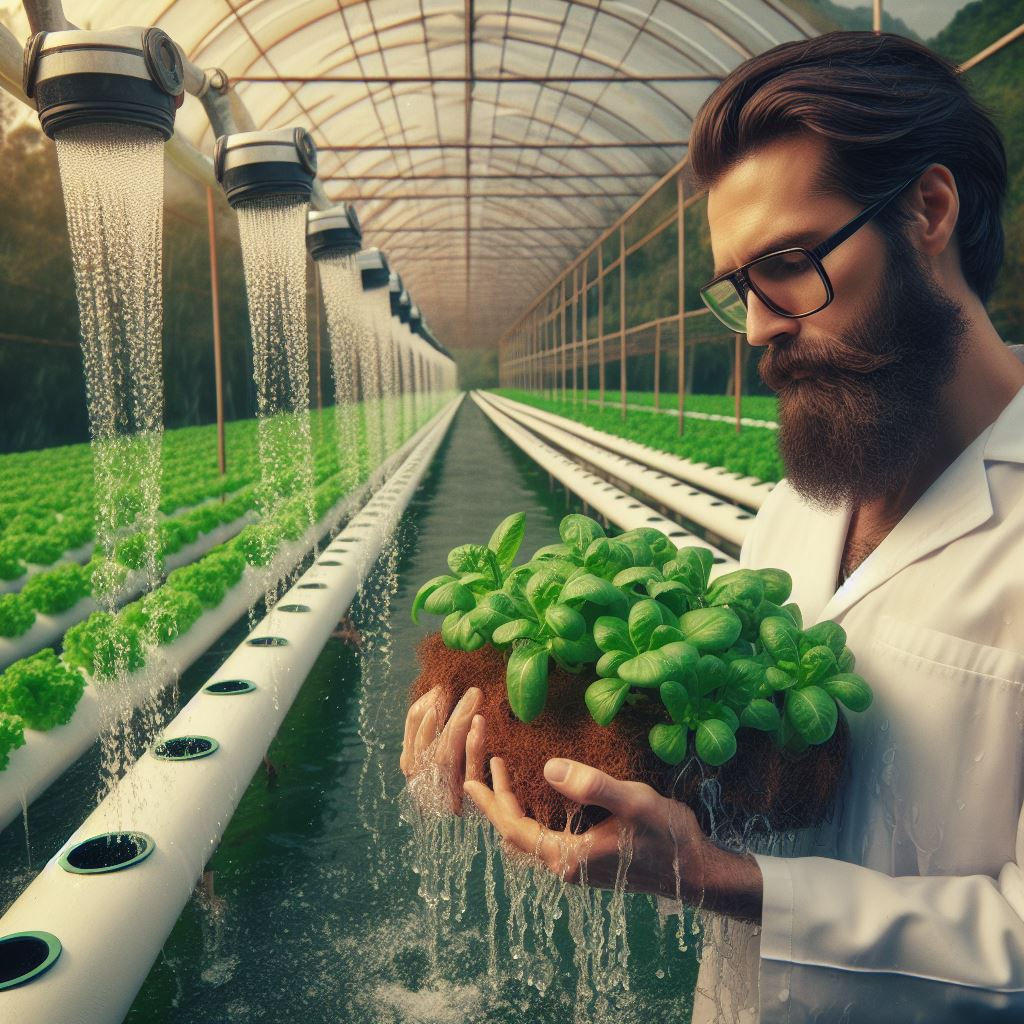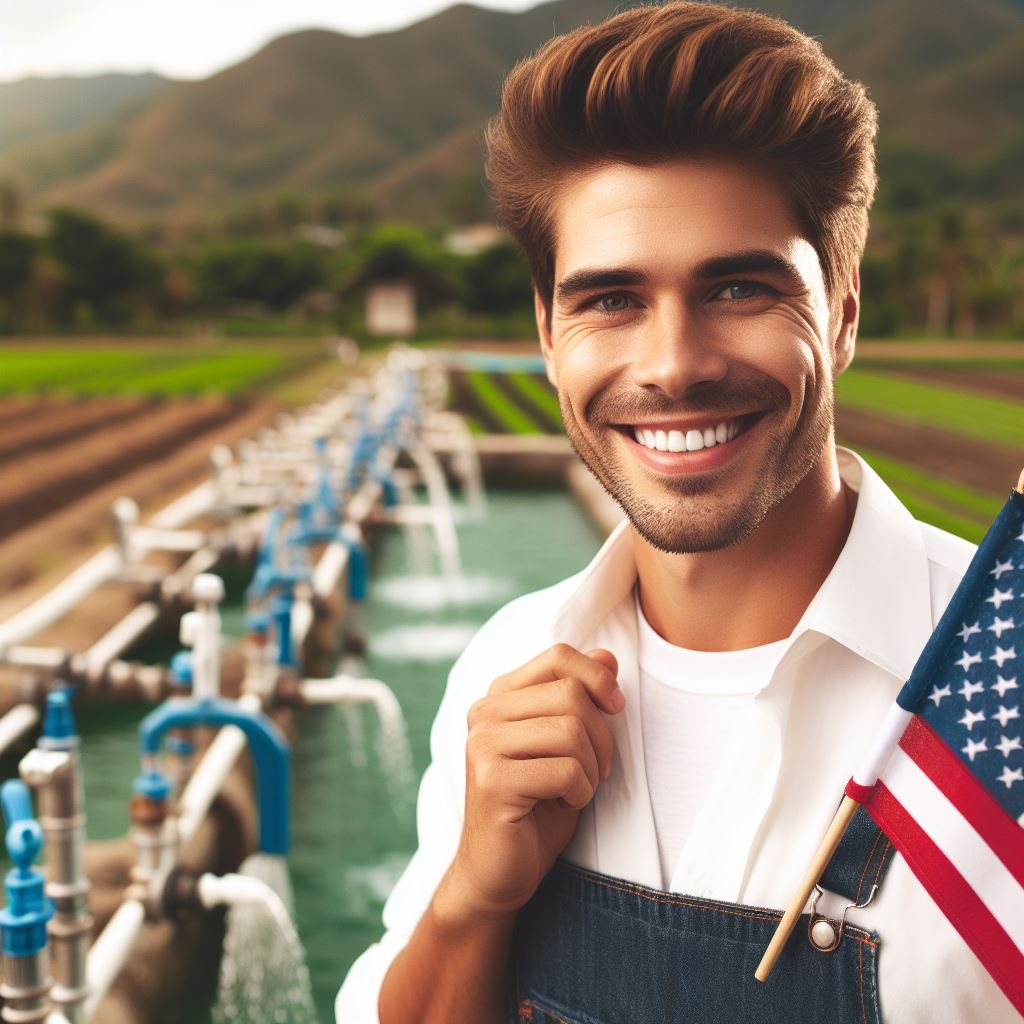Introduction
Let’s explore Hydroponics Farming in Water Crisis.
Definition of hydroponics farming
Hydroponics farming is a revolutionary approach that is gaining popularity as a sustainable farming method.
With the increasing water crisis in agriculture, traditional soil-based farming is facing significant challenges.
The scarcity and mismanagement of water resources have led to reduced crop yields and increased environmental degradation.
However, hydroponics farming offers a beacon of hope in this grim scenario.
Brief explanation of the water crisis in agriculture
Hydroponics farming involves growing plants in water-based nutrient solutions, bypassing the need for soil.
This method allows precise control over the nutrient composition and pH levels, ensuring optimal growth and maximizing crop yields.
Unlike traditional farming, hydroponics consumes significantly less water as it recirculates and reuses the nutrient solution.
This makes it an ideal solution for regions experiencing severe water scarcity.
Thesis statement: Hydroponics presents a promising solution for farming amid a water crisis
Additionally, hydroponics farming enables farmers to grow plants vertically, utilizing limited space efficiently.
This vertical farming approach allows multiple layers of crops to be grown in a confined area, increasing overall productivity.
By minimizing water usage and maximizing land utilization, hydroponics farming proves to be a sustainable alternative to traditional agriculture.
Furthermore, hydroponics farming minimizes the use of chemical pesticides and fertilizers, reducing pollution and environmental impact.
The controlled environment in hydroponics systems eliminates the need for extensive pesticide use, leading to healthier and safer produce.
This method also reduces soil erosion and contamination, preserving the quality of land for future generations.
Transform Your Agribusiness
Unlock your farm's potential with expert advice tailored to your needs. Get actionable steps that drive real results.
Get StartedIn general, hydroponics farming presents a promising solution for farming in the face of a water crisis.
Its water efficiency, land utilization, and environmental benefits make it an attractive option for farmers.
Embracing hydroponics can help mitigate the water crisis in agriculture and ensure a more sustainable future for food production.
Read: Tech in Agri: Saving Water Amidst Climate Woes
The water crisis in agriculture
Overview of water scarcity issues globally
Water scarcity is a pressing issue worldwide, affecting both developed and developing nations.
Rapid population growth, climate change, and inadequate water management contribute to water scarcity.
Increasing water demand from various sectors puts additional strain on already limited water resources.
Water scarcity threatens food security and exacerbates poverty and socio-economic disparities.
Impact of water scarcity on traditional farming methods
Traditional farming methods heavily rely on freshwater sources, leading to inefficient water usage.
Crop irrigation consumes a significant portion of available freshwater, contributing to water scarcity.
Water shortage hampers crop productivity, reduces yield, and increases the risk of crop failure.
Traditional farming practices are unsustainable in the long run due to their high water consumption.
Need for sustainable and efficient farming practices to conserve water
Hydroponics offers a viable solution by minimizing water usage through innovative farming techniques.
Hydroponics is a soil-less cultivation method that utilizes nutrient-rich water solutions for plant growth.
This technique allows for more precise control over water usage, reducing wastage and maximizing efficiency.
By providing plants with the necessary nutrients directly, hydroponics eliminates the need for excessive water.
Hydroponic systems can be implemented in various environments and are adaptable to water scarcity challenges.
The controlled environment in hydroponics prevents water pollution and minimizes the use of fertilizers.
Hydroponics enables year-round cultivation and higher crop yields while conserving water resources.
Implementing hydroponics on a larger scale can alleviate the pressure on traditional agriculture systems.
Governments and agricultural institutions should promote and invest in hydroponics to mitigate water crises.
Generally, water scarcity poses significant challenges to traditional farming methods.
However, by adopting sustainable and efficient hydroponic systems, we can revolutionize agriculture and mitigate the water crisis.
Hydroponics not only conserves water but also increases crop productivity and ensures food security for future generations.
Showcase Your Farming Business
Publish your professional farming services profile on our blog for a one-time fee of $200 and reach a dedicated audience of farmers and agribusiness owners.
Publish Your ProfileRead: Permaculture Tales: Farming with Nature
Understanding hydroponics farming
Definition and principles of hydroponics
Hydroponics is a method of growing plants in a nutrient-rich water solution, without using soil.
It is based on the principle that plants can obtain all necessary nutrients directly from water.
Different types of hydroponic systems
Various hydroponic systems are available, including the nutrient film technique, deep water culture, and aeroponics.
These systems differ in how they deliver water and nutrients to the plants.
Advantages of hydroponics over traditional farming methods
- Efficient water usage: Hydroponics uses up to 90% less water compared to traditional soil-based farming methods. This is especially significant in regions facing water scarcity and drought.
- Elimination of soil requirements: Since hydroponics does not rely on soil, it eliminates the need for fertile land. This allows farming in urban areas or non-arable regions where soil quality is poor.
- Enhanced plant growth and yield: Hydroponics provides plants with a constant supply of nutrients, resulting in faster growth and higher yields. Plants in hydroponic systems also exhibit fewer pest and disease problems.
- Potential for year-round cultivation: Hydroponics allows for controlled environment cultivation, enabling year-round production regardless of weather conditions. This is particularly advantageous for farmers in regions with limited growing seasons.
Ultimately, hydroponics is a revolutionary farming method that maximizes water efficiency, eliminates the need for fertile soil, and enhances plant growth and yield.
By understanding the principles of hydroponics and exploring the various systems available, farmers and gardeners can harness the benefits of this innovative approach to farming.
Read: Climate Shifts: Adapting Farm Water Tactics
Success stories and real-world applications
In this section, we explore some success stories and real-world applications of hydroponics farming.
From arid regions to urban environments, hydroponics has proven to be an innovative and sustainable solution.
Examples of hydroponics farming in arid regions
Case study: Israel’s success in utilizing hydroponics
One notable success story in hydroponics farming is Israel, a country with limited water resources and arid regions.
Israel has effectively embraced hydroponics to overcome water scarcity and grow crops in desert environments.
By implementing hydroponic systems, which involve growing plants without soil and supplying nutrients through water, Israel has revolutionized its agriculture industry.
Hydroponics allows for precise control over water and nutrient levels, resulting in increased crop yields and efficient utilization of resources.
Israel’s success in hydroponics farming can be attributed to its cutting-edge technologies, such as drip irrigation, which delivers water and nutrients directly to the plant’s roots.
This targeted approach minimizes water waste and maximizes plant growth.
Moreover, Israel has developed innovative water desalination techniques, further overcoming freshwater scarcity challenges.
Benefits for regions with limited access to freshwater sources
Hydroponics farming offers numerous benefits for regions facing limited access to freshwater sources.
In arid areas, traditional agriculture is often unsustainable due to water scarcity and reliance on rainfall.
Hydroponics provides a viable alternative, as it requires significantly less water compared to conventional farming methods.
By implementing hydroponics systems, farmers in water-stressed regions can cultivate crops without depending on rainfall or access to freshwater sources.
The closed-loop system of hydroponics allows for recycling and reusing water, minimizing wastage and conserving this valuable resource.
Moreover, hydroponics enables farmers to grow crops year-round regardless of weather conditions.
This consistent production helps ensure food security and economic stability in regions affected by water scarcity.
Hydroponic farms also reduce dependence on imported food, promoting self-sufficiency and local economic growth.
Hydroponics in urban farming
Utilizing vertical farming and rooftop gardens
Hydroponics plays a crucial role in urban farming, where space is limited. Vertical farming, a practice that involves growing plants in vertically stacked layers, is gaining popularity in cities.
This technique allows for high-density cultivation, maximizing crop output within limited urban areas.
Additionally, rooftop gardens provide an excellent opportunity for hydroponics in urban farming.
Underutilized rooftop spaces can be transformed into productive gardens, mitigating the urban heat island effect and improving air quality.
By utilizing hydroponic systems, rooftop gardens can flourish without the need for soil, reducing the weight load on buildings.
Making use of limited space and reducing water footprint
Hydroponics in urban farming not only optimizes space but also minimizes water usage.
Traditional agriculture requires vast amounts of water, making it unsustainable in urban environments with limited water resources.
In contrast, hydroponic systems use up to 90% less water while producing higher crop yields.
By reducing water requirements, hydroponics enables urban farmers to contribute to water conservation efforts and combat water scarcity.
The closed-loop system in hydroponics prevents water runoff and contamination, ensuring the efficient utilization of water resources.
Therefore, hydroponics has proven to be a versatile and sustainable farming method in various real-world applications.
From arid regions like Israel to densely populated urban areas, hydroponics offers solutions to overcome water scarcity, maximize limited space, and reduce the water footprint in agriculture.
With continued research and implementation, hydroponics will undoubtedly play a crucial role in farming’s future amidst the water crisis.
Read: Smart Irrigation: Future of Water in Farming

Challenges and limitations of hydroponics farming
Initial capital investment and operational costs
While hydroponics farming offers several advantages, it also faces challenges and limitations that need to be addressed.
Showcase Your Farming Business
Publish your professional farming services profile on our blog for a one-time fee of $200 and reach a dedicated audience of farmers and agribusiness owners.
Publish Your ProfileOne of the primary challenges is the initial capital investment and high operational costs associated with setting up and maintaining a hydroponic system.
Unlike conventional farming, hydroponics requires specialized infrastructure and equipment, contributing to the overall expenses.
Additionally, ongoing operational costs, including electricity, water filters, and nutrient solutions, significantly add to the financial burden of hydroponic farmers.
Technical knowledge and skills required for setup and maintenance
Moreover, hydroponics farming demands extensive technical knowledge and skills for successful implementation.
Farmers must understand the principles of plant nutrition, pH balancing, and water management to provide the optimal conditions for plant growth.
This specialized expertise may act as a barrier for individuals without a background in agriculture or horticulture.
Furthermore, hydroponic systems require continuous monitoring and adjustment of environmental conditions, such as temperature, humidity, and light intensity, making it a labor-intensive process.
Environmental concerns related to energy consumption and waste disposal
Another concern associated with hydroponics farming is its environmental impact.
While hydroponic systems can conserve water compared to traditional soil-based agriculture, the reliance on artificial lighting for plant growth leads to increased energy consumption.
This not only adds to operational costs but also contributes to a higher carbon footprint.
Additionally, the use of synthetic nutrients and pesticides in hydroponics can have negative ecological implications, potentially polluting surrounding ecosystems if not managed appropriately.
The proper disposal of nutrient solutions and unused plant materials is equally crucial to prevent contamination and environmental damage.
Addressing these challenges and limitations is essential to ensure the sustainable growth of hydroponics farming.
Governments and institutions can play a crucial role by providing financial support and incentives to farmers to reduce the initial capital investment and operational costs.
Furthermore, educational programs and training courses should be offered to enhance technical knowledge and skills among aspiring hydroponic farmers.
Promotion of research and development in sustainable energy sources and nutrient management can help mitigate the environmental concerns associated with hydroponics.
Lastly, while hydroponics farming presents a promising solution to mitigate water scarcity and address food security concerns, it is not without challenges.
The initial capital investment, operational costs, technical knowledge requirements, and environmental concerns pose limitations to widespread adoption.
By addressing these challenges through financial support, education, and research, hydroponics farming can overcome its limitations and become a sustainable and efficient farming method of the future.
Future prospects and potential advancements
Research and development in hydroponics farming
Research and development in hydroponics farming continue to drive innovation and improve crop yields.
New nutrient solutions and cultivation techniques are constantly being studied and developed.
Scientists are also exploring the use of different substrates to support plant growth in hydroponics systems.
The goal is to create more efficient and sustainable methods of growing crops without soil.
Integration of technology for automation and optimization
The integration of technology is an exciting prospect for the future of hydroponics farming.
Automated systems can monitor and adjust environmental conditions to optimize crop growth.
Sensors can track nutrient levels, pH, and moisture content to ensure plants receive the necessary resources.
Advancements in AI and machine learning can help analyze data to make more accurate and precise adjustments.
Remote monitoring and control systems enable farmers to manage their hydroponics setups from anywhere.
These technological advancements reduce labor and improve efficiency in hydroponics farming.
Collaboration and knowledge-sharing among farmers, scientists, and policymakers
The future of hydroponics farming depends on collaboration and knowledge-sharing among various stakeholders.
Farmers can benefit from sharing their experiences, challenges, and successes.
Scientists can conduct research and experiments to develop best practices for growing different crops hydroponically.
Policymakers play a crucial role in creating regulations and incentives to support hydroponics farming.
Collaborative efforts can lead to the development of standardized practices and guidelines for hydroponics farming.
By sharing knowledge and expertise, stakeholders can collectively overcome challenges and drive the advancement of hydroponics.
Most importantly, the future of hydroponics farming holds immense potential for advancements.
Research and development, integration of technology, and collaboration among stakeholders are key.
With continued innovation and knowledge-sharing, hydroponics farming can help address future water crises and ensure sustainable food production.
Conclusion
Recap of the benefits of hydroponics in addressing the water crisis
Hydroponics offers a sustainable solution to farming in water-scarce regions.
By using nutrient-rich water solutions instead of soil, hydroponic systems reduce water usage by up to 90%.
Showcase Your Farming Business
Publish your professional farming services profile on our blog for a one-time fee of $200 and reach a dedicated audience of farmers and agribusiness owners.
Publish Your ProfileThis method also eliminates the need for harmful pesticides and herbicides, resulting in healthier produce.
Encouragement for wider adoption of hydroponics in farming practices
With the global water crisis worsening, farmers must embrace hydroponics to ensure food security.
The ability to grow crops without relying heavily on irrigation systems allows farmers to mitigate the impact of water scarcity on their livelihoods.
Additionally, hydroponics can be implemented in various environments, such as urban areas and indoor spaces, making it accessible to a wider range of farmers.
Call to action: Supporting and promoting sustainable agricultural practices for a water-scarce future
Governments, organizations, and individuals need to support and promote the adoption of hydroponics and other sustainable farming practices.
Investing in research and development, providing financial incentives, and educating farmers about the benefits of hydroponics can accelerate its widespread adoption.
By taking action now, we can build a more resilient agricultural sector and secure our future food supply in the face of water scarcity.




